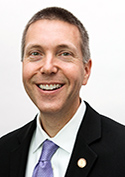
John S. Steinberg, DPM, FACFAS
ACFAS President
ACFAS is without question an education-focused special interest group. “Proven Leaders, Lifelong Learners, Changing Lives” is our motto, and we do a pretty good job of sticking to it in our daily business as an organization. One key area of attention and great success has been the ACFAS Recognized Fellowship Initiative, which started in 2010 and has evolved into a highly visible part of our College. Individual fellowship programs meeting/exceeding a list of specific criteria are officially “Recognized” by the College, which will in turn provide these programs support and visibility.
How?
It is important to understand that the ACFAS Recognition program is NOT an “Accreditation” process. If a fellowship program desires accreditation or is required to do so by its institution, then the Council on Podiatric Medical Education (CPME) would be the group to provide this evaluation. However, in keeping with the trend of most other surgical specialties in the country, most foot and ankle surgery postgraduate fellowships are nonaccredited. Funding is a major reason fellowships would choose to be nonaccredited, as this allows the program to receive corporate educational grants, as well as the fellow to serve as a “junior attending” and to submit charges for patient care services. Most hospitals will not support a fellowship salary, as there is no federal reimbursement for fellowships in our specialty.
Why?
I did one of the early postgraduate fellowships in our profession at the University of Texas from 1998–1999 when I had just completed residency training. Since this was a new concept at the time, I remember some of my attendings wondering WHY I would want to do a fellowship after three years of residency. Some of them were even insulted by my choice as they felt it was a statement that the training I received in residency was somehow insufficient. Untrue for sure. Fellowships are something that augment and enhance your level of training and are often a pathway for those who seek to include education and research as part of their future practice. My fellowship was responsible for the career path I am on today, and it heavily enabled my academic and clinical work I do daily.
Now, as a residency director and former fellowship director, I highly recommend fellowship training to just about all my residents and students. I firmly believe having fellowship-trained foot and ankle surgeons in our profession makes us all more visible, more credible and more valuable to the healthcare system. If we want parity, then we must do the work, and our training models must mirror those of our surgical colleagues. This doesn’t mean that everyone has to do a fellowship to be a credible surgeon. However, in following with the rest of healthcare, we should have a cohort of our profession that receives more than the minimum required specialty training and can serve to elevate the level of care we all offer. The ACFAS Recognized Fellowship Initiative currently has 46 approved programs, and the CPME website currently lists 13 accredited fellowship programs. There are also a handful of nonrecognized/nonaffiliated fellowships in the country. If you do the math, with approximately 600 DPM residency graduates annually in the United States, only 10 percent will be able to complete fellowship training. Is there a right or wrong percentage for this? I have no idea. The list of ACFAS Recognized Fellowships is certainly growing, and the Fellowship Committee is working diligently to make sure that growth is justified and constructive. We are very much attuned to valid concerns of quantity over quality. We must ensure that “ACFAS Recognized Fellowship” is a branding that is earned and monitored so resident applicants can be assured they will receive the added training experience they expect. I don’t think any of us can know the “right” numbers or ratios that will optimize this process, but I do know the ACFAS Fellowship Committee is focused on high quality and consistency as the best path forward.
So, to fellowship or not to fellowship? I do feel strongly we need high-quality postresidency fellowship programs, and I do believe we all benefit from them. The graduates of these programs are currently the leaders in many aspects of education and research for our specialty. I have experienced firsthand the fact that having the distinction of fellowship training can make a career-defining difference, and I am proud that ACFAS is helping navigate this pathway for our profession.
